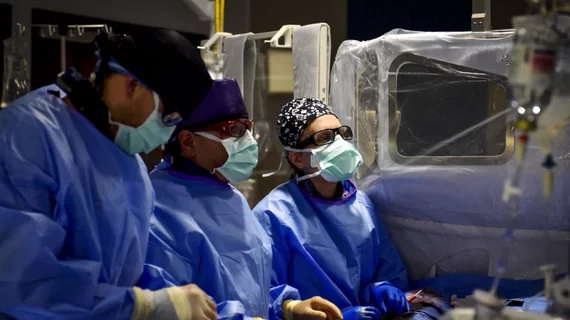Percutaneous coronary intervention (PCI) can improve the odds of survival for certain ischemic heart failure (HF) patients with moderate-to-severe functional mitral regurgitation (FMR), according to new findings published in the American Journal of Cardiology.
“FMR is common in patients with HF, especially in those with ischemia and left ventricular systolic dysfunction (LVSD),” wrote first author Anping Cai, MD, a cardiologist at Guangdong Academy of Medical Sciences in China, and colleagues. “Patients with HF with FMR have a high all-cause mortality risk despite receiving optimal medical therapy, surgical mitral valve repair or replacement, valve repair combined coronary artery bypass grafting or transcatheter mitral valve repair combined medical therapy.”
However, the team added, “FMR because of ischemic HF might be amendable.”
Cai et al. tracked data from nearly 1,500 patients treated from December 2015 to June 2019 at a single, high-volume facility. All patients presented with ischemic HF with left ventricular ejection fraction higher than 45% and underwent transthoracic echocardiography. Physicians reviewed each patient’s symptoms when deciding if they should undergo PCI. All patients undergoing PCI were matched 1:1 with a patient who did not undergo PCI.
Nearly 40% of the cohort had moderate-to-severe FMR. Patients with moderate-to-severe FMR who underwent PCI were more likely to present with acute coronary syndrome or severe coronary artery stenosis, but less likely to have a history of chronic HF or previous PCI treatment.
Overall, among patients with none-to-mild FMR, all-cause mortality after a median follow-up period of 3.1 years was 10.1% for PCI patients and 14.2% for non-PCI patients. The difference between these two “comparable” mortality rates were not considered to be significant.
Among patients with moderate-to-severe FMR, however, all-cause mortality after a median follow-up period of 2.9 years, all-cause mortality was 20.4% for PCI patients and 31.6% for non-PCI patients.
“In patients with moderate-to-severe FMR and severe LVSD, compared with medical therapy, PCI treatment was associated with a 22% reduction of all-cause mortality,” the authors wrote.
The team’s findings also suggested that PCI could provide additional value for patients experiencing certain kidney complications.
“Impaired renal function is associated with high mortality risk in patients with ischemic HF,” the authors wrote. “Importantly, the results of subgroup analysis suggested that the mortality benefit of PCI treatment was greater in those with a lower estimated glomerular filtration rate. These observations indicate that PCI treatment might be a potentially feasible approach to improve the prognosis in the high-risk population group.”
Cai also emphasized that these relationships between PCI and FMR do not apply to patients with non-ischemic HF or patients presenting with HF with preserved ejection fraction.
Related Vascular and Endovascular Content:
Evolocumab limits adverse cardiovascular outcomes among PCI patients
Distal radial access consistently lowers risk of artery occlusion during PCI
FDA Roundup: AAA EVAR recommendations, key approvals in stroke care and interventional cardiology
TAVR-related ischemic stroke linked to worse outcomes, higher Medicare costs
Reference:

